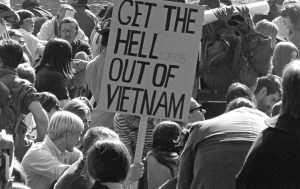The US bombing of Hiroshima and Nagasaki, the Damascus Incident and the US’s unjust strategy during the Vietnam War serve as important lessons for international security. These historical examples are significant, as their consequences inform how the U.S. should handle current and future security issues.
Hiroshima & Nagasaki
During World War II, the US bombed the Japanese cities of Hiroshima and Nagasaki within three days of each other. Although the US bombing of Hiroshima and Nagasaki remains the only use of an atomic bomb in history, the US and other countries currently have the ability to use nuclear weapons. In fact, many countries today continue to find ways to improve their nuclear capabilities. Thus, it is imperative to take away lessons from this historical event and to recognize the horrific consequences at stake with regards to the use of nuclear weapons. (Groot 1970).

(“Bombing of Hiroshima and Nagasaki,” 2009)
The overarching lesson the US can learn from its bombing of Hiroshima and Nagasaki is just how catastrophic nuclear weapons can be. It was estimated that the bombing killed about 140,000 people in Hiroshima and another 74,000 in Nagasaki. 70% of Hiroshima’s buildings were also destroyed. In addition, years later some survivors faced many side effects, including cancer and other chronic diseases, from the radiation. (“Hiroshima and Nagasaki Bombings.” 2017). Therefore, Hiroshima and Nagasaki demonstrate the large-scale and indiscriminate nature of nuclear weapons, as they are capable of causing widespread death and mass destruction.
Due to the aftermath of this historical event, the US should be aware of the inhumane nature of nuclear weapons. According to Schelling, the real purpose of dropping the bombs on Hiroshima and Nagasaki was to send a message to policy makers in Tokyo that the US was capable and willing to use its nuclear arsenal (Schelling 1996, 17). Interestingly enough, prior to the Hiroshima and Nagasaki bombing, Japan had lost much power and influence in the Asia-Pacific region during WWII. Japan, thus, had very different capabilities than the US at the time. Japan had actually attempted to convey to Washington its desire to surrender months before the bombing (Kawasaki et al. 2015). Yet, the US still managed to not only attack Japan, but to use the most powerful, destructive force in the world against it. Therefore, it is important to look back at this event, as it demonstrates the “disregard with which policy makers in Washington [sometimes] treat human life in pursuit of strategic objectives” (Kawasaki et al. 2015). Evidently, the purpose of nuclear weapons is to threaten an adversary. Yet, this example in Hiroshima and Nagasaki should force US policy makers to question whether it is morally justifiable to use nuclear weapons and kill innocent people for the purpose of sending a message.
Damascus Incident
While the bombing of Hiroshima and Nagasaki demonstrated the catastrophic nature of nuclear weapons, the Damascus Incident revealed the potential consequences of a mistake with nuclear energy. The strategic logic behind deterrence and compellence with regards to nuclear weapons often assumes that everything will go as planned (Elias, Barbara. “Race, Gender and Nuclear Accidents.” September 30, 2020). However, it is evident that accidents naturally happen, which can be harmful to international security. Therefore, the US must learn from its nuclear energy accident in 1980.

(Guerrieri 2020)
In the Fall of 1980, the Titan Missile Complex in Arkansas almost exploded a missile carrying a nuclear warhead, which was the most powerful nuclear weapon built by the US. To put this in perspective, it was 600x more powerful than the bomb that was dropped on Hiroshima. The accident was due to a wrench socket that fell from the air and punctured the missile, causing explosive rocket fuel to be unleashed and fear that the rocket may explode. The problem with this incident was that there was no contingency plan and even the leaders of the Strategic Air Command struggled to reclaim control of the warhead. Governor Bill Clinton and the US Air Force had to solve this accident. Had the US not come to a solution, Little Rock, Arkansas would have been completely annihilated and radioactive effects would have spread across the East Coast of the US. (Elias, Barbara. “Race, Gender and Nuclear Accidents.” September 30, 2020).
The Damascus Incident of 1980 reveals how the pure US acquisition of nuclear weapons can threaten the country’s stability. Even if stable nuclear deterrence is established among countries, nuclear accidents can still occur. This incident is important, as it relates to the justification defense intellectuals make for the use of nuclear weapons: When discussing the justification for using nuclear weapons, “human factors are irrelevant to the calculus of gain and loss” (Cohn 1987, 711). Therefore, US defense specialists are disconnected from the harmful realities of holding nuclear weapons. Also, it seems that they are so focused on the need to hold nuclear weapons, that the potential accidents that can occur are overlooked. Yet, the Damascus Incident emphasizes the danger in simply holding nuclear weapons. Thus, it is important for leaders in the US government to be aware of the utter destruction that can come from both the use and the acquisition of nuclear weapons. The US has weapons of colossal massive destruction at its disposal. This possession has the potential to threaten the security of the nation immensely, if US officials are not cautious in their nuclear acquisition strategy or prepared for mistakes to happen.
Vietnam War
Furthermore, the US strategy in the Vietnam War demonstrates the difficulty in obliterating an opponent’s entire will to fight by relying on military and technological advancements against them. The Vietnam War serves as a good example of the shift from 3rd Generation Warfare (3GW) to 4th Generation Warfare (4GW) and the significance of waging just war in this changing world. While it certainly depends on the type of war, destroying an opponent’s willpower can often be crucial to winning a war. In World War I and II, war was conventional, and military dominance was key to devastating the opponent’s willpower. However, war has changed since World War II. Some state and non-state actors have transitioned to more unconventional tactics, while others have remained focused on technological and military advances, such as the US in the Vietnam War. The US entered the Vietnam War in the 1960s and competed against the National Liberation Front (NLF). The NLF was an insurgency with limited technological strength, while the US was much more militarily advanced. However, the NLF was ultimately able to force the US to withdraw. Consequently, the Vietnam War should serve as a lesson for the US that “military and technological superiority may be a highly unreliable guide to the outcome of wars” (Mack 1975, 75) and that “justice” can be central to success (Walzer 2002, 930).
During the Vietnam War, the US made the mistake of relying on technological advancement. This strategy proved to be ineffective in destroying the NLF’s willpower for many reasons. For example, the US was so fixated on technology, that it ignored the human aspect of war: The Vietnam War proved to be a “war for ‘hearts and minds’ rather than for land and resources,” which made “justice” the “key to victory” (Walzer 2002, 930). However, the US used resources such as herbicides, defoliants, napalm and anti-personnel weapons during the war, which often harmed civilians. These devastating actions only exacerbated Vietnamese opposition (Mack 1975, 186).

(Pach, 2015)
According to Walzer, the US antagonizing of the Vietnamese civilian population caused the US to lose the Vietnamese population’s “hearts and minds” and thus, the war itself (Walzer 2002, 931). Furthermore, the media published sensationalized images of wounded civilians and soldiers to show the devastating effects of US military tactics. As a result, US public opinion against the war increased dramatically, as most Americans no longer believed the US was fighting against an enemy worthy of such destruction. The US was ultimately pressured to withdraw (Hammes 2006, 65-66). Therefore, US actions during the war decreased domestic support as well as further encouraging the NLF’s willpower. The US’s military-focused approach during Vietnam demonstrates that killing civilians and acting unjustly has actually become strategically harmful. The NLF, on the other hand, was successful in defeating such a superior military force, as it engaged in forms of unconventional warfare (Mack 1975, 195).

(Jennemann 2012)
Consequently, the fact that the US, being a military powerhouse, was unable to destroy the willpower of the technologically weak NLF, proves that a lesson is to be learned here: Technological superiority is not always fundamental to winning a war; it can actually make it even harder to destroy an opponent’s will and can impair a superpower’s international reputation. Especially with the increasing presence of media, the US needs to learn from Vietnam and focus more on being strategically “just” in war rather than trying to completely destroy the other side. The media can easily expose atrocities and even distort them. Thus, the US must not make the same mistakes as it did in Vietnam if it wants to maintain a strong domestic and international reputation.
